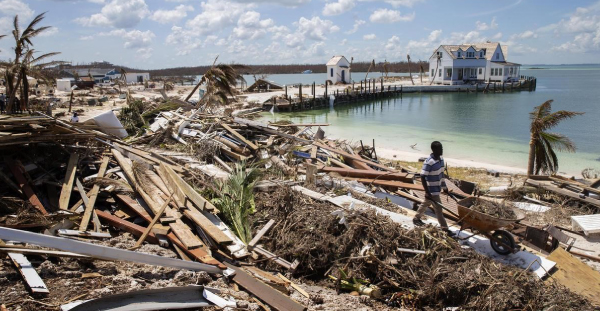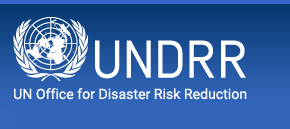- Our Mandate
- Mission and Objectives
- UNDRR in the UN
- Work Programme & Annual Reports
- Results Based System
- Work Partnerships
- Headquarters - Geneva
- SG-UN representatives for DRR
- Regional Office – The Americas and the Caribbean
- Head of the Regional Office – The Americas and the Caribbean
- What is Disaster Risk Reduction?
- What is the International Strategy?
- History of UNDRR
COVID-19 risks complicating Caribbean hurricane season
 Photo description: Hurricane Season is near in the Caribbean. Credit: CBS
Photo description: Hurricane Season is near in the Caribbean. Credit: CBS
By: Sophie Hares, UNDRR – Regional Office for the Americas and the Caribbean
The chance of a deadly Caribbean hurricane clashing with the peak of the COVID-19 pandemic remains slim but many countries are bracing for a two-tier crisis as they grapple with complicated logistics, limited resources and scant supplies.
Training rescuers, increasing medical capacity and sourcing protective equipment are among the major challenges for the Caribbean, where a sharp drop-off in tourism and trade has dealt a heavy blow to many cash-strapped countries.
"The biggest concern is going to be resource availability to deal with the COVID crisis and the implication it will have for the upcoming hurricane season", said Ronald Jackson, executive director of the Caribbean Disaster and Emergency Management Agency (CDEMA).
As the COVID-19 curve flattens, there are still likely to be numerous cases in the Caribbean where hurricane season contingency planning and "dress rehearsals" are being affected by the pandemic, experts said.
"The big spike of COVID 19 in the region is going to be from the middle of April to middle of May… the hurricane season is coming in June", said Walter Cotte, Americas regional director for the International Federation of Red Cross and Red Crescent Societies
"Maybe we will have a gap between them and we will have opportunities to be better prepared. But if this does not happen and there is an overlap between COVID and the hurricane season, it's going to be more critical", he added.
DUTY OF CARE
Emergency rescue response is likely to be hit hard by the virus, he said, as people become infected they need to look after relatives at home or are unwilling to go into disaster areas without sufficient protective equipment.
Cotte estimates just 10-20 percent of responders would now be properly equipped and trained to rescue people in an emergency.
Efforts are underway to make sure around 30 percent of responders are trained and equipped, but a global run on emergency protective equipment is pushing up prices and making it hard to find sufficient supplies for people on the frontline, he said.
"There is no way to do just rescue without duty of care, it's a double responsibility now", he said.
Additionally, quarantine restrictions could restrict international rescuers from reaching a disaster area, said CDEMA's Jackson, suggesting countries consider calling on the private sector to provide volunteers to help in an emergency.
The already tricky logistical task of reaching hurricane-hit areas is also likely to be further complicated by COVID, warned Cotte, highlighting the challenge in reaching the Bahamas, Barbuda and Dominica after recent devastating storms.
COVID COMPLICATIONS
Finding ways to ramp up the capacity of the region's often limited health infrastructure is also crucial given many facilities face being overwhelmed by COVID cases and would not cope with the additional pressure of a disaster, said experts.
But once the hurricane season picks up, countries need to find ways to limit COVID contagion and maintain social distancing rules for people evacuated to emergency shelters, said cuban meteorologist José Rubiera.
"We will have passed the peak when the hurricane season arrives", said the meteorologist. "In the active season, after August, the situation will be different but you will still have to take (virus) precautions, he added".
The heavy economic cost of COVID could mean governments have less money to stockpile ahead of a hurricane and fund recovery if their country is badly hit, said Jackson.
HEAVY COST
Many countries were preparing themselves for this year's hurricane season by boosting capacity, improving deployment plans, logistics, supply chains and communications, he said.
Jamaica and St. Lucia were among those reducing their financial risk through a mix of facilities such as contingent credit, funds from the national budget and insurance mechanisms.
The risk now is that the COVID-19 crisis gnaws away at emergency funds in place to deal with a hurricane while international donor money for surge financing and appeals becomes much harder to find, he said.
"It really is around how much you've had to draw down to tackle this particular crisis before the next crisis comes", said Jackson.
Going forward, better coordination between Caribbean governments, multilateral organisations, the private sector and communities is essential to strengthen the region and position it to recover quickly from future disasters, said Cotte.
"We need to create a region in the Caribbean and the Americas in which everyone is resilient, everyone is well prepared", he said. "We are living in a region that is full of vulnerabilities and problems and COVID is proving the point, it's putting everyone in the same page".
Follow the UNDRR news online :
 Now we have twitter account @UNDRR Américas y el Caribe
Now we have twitter account @UNDRR Américas y el Caribe
JOIN US!
Tweets por el @UNDRR Américas y el Caribe
